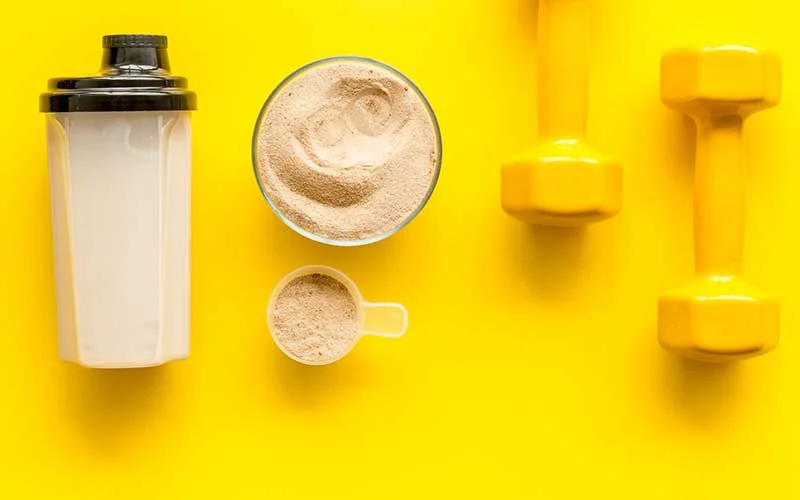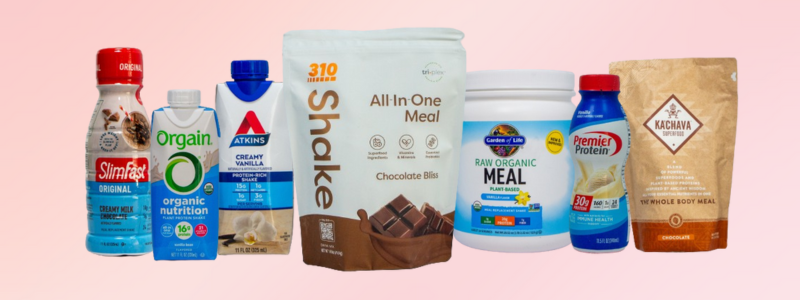We know you’ve been there (because we have to!). You’ve...
Meal replacement shakes have become popular for those looking to maintain a balanced diet while on-the-go. But with many options available, how do you choose the right meal replacement shake for your needs? This comprehensive guide will walk you through the process and help you make an informed decision that aligns with your nutritional goals and budget.
How to Choose the Right Meal Replacement Shake?
Choosing the right meal replacement shake is key to maintaining a healthy diet. Here’s a guide to help you make an informed decision and find a shake that suits your needs and preferences.
Understanding the Types of Shakes
Understanding the various types of meal replacement shakes is pretty important. It helps you choose the one that’s right for what you want. Some shakes are great for weight loss, while others are perfect if you want to build muscles.
There are even options for special diets like vegan. Plus, some shakes are ready to drink, while others need to be mixed with water or milk. It’s a bit like picking your favorite flavor that you enjoy and fits your lifestyle. So, getting a handle on the different types of shakes helps you get precisely what you need.
Nutritional Considerations
Now that you’re aware of the types of meal replacement shakes, let’s dive into the key nutritional aspects to consider when choosing the right one for you:
Protein Content: Protein is essential for muscle repair and overall body function. Daily needs vary by age, gender, and activity. Adults should aim for about 0.8g of protein per kg body weight. Athletes may need more. Choose a shake that meets your protein needs.
Carbohydrates and Fats: Balancing the intake of carbohydrates and fats is crucial as they provide energy and support essential bodily functions. The specific ratio you should aim for depends on your individual goals. Low-carb shakes are tailored for those seeking to reduce their carbohydrate intake, whereas balanced shakes offer a sustained source of energy.
Essential Vitamins and Minerals: Look for drinks with vitamins (like D), calcium, iron, and potassium. These boost overall health and wellness.
Evaluating Ingredients
When assessing meal replacement shakes ingredients, look closely at the list. Opt for products with natural and recognizable ingredients. Be wary of shakes with a long list of artificial additives, sweeteners, or preservatives.
Reading Labels: What to Look For?
Understanding how to read labels is crucial in making informed choices. Here’s what to look for:
Serving Size: Pay attention to the quantity and adjust your consumption accordingly.
Calories: Ensure that the shake aligns with your calorie goals, whether for weight loss, maintenance, or muscle gain.
Macronutrients: Check the amounts of protein, carbohydrates, and fats to ensure they match your dietary needs.
Fiber: Adequate fiber intake is essential for digestion and overall gut health. Look for shakes with a decent fiber content.
Sugars: Keep an eye on the sugar content. High sugar content can lead to energy spikes and crashes.
Allergens: If you have food allergies or sensitivities, be vigilant about potential allergens in the ingredients.
Common Additives and Preservatives to Avoid
To make an informed choice, steer clear of shakes that contain the following common additives and preservatives:
High-Fructose Corn Syrup: This highly processed sweetener can contribute to weight gain and metabolic issues.
Artificial Sweeteners: Some artificial sweeteners may have health concerns associated with them. Opt for naturally sweetened shakes when possible.
Trans Fats: These unhealthy fats can raise your risk of heart disease. Avoid shakes that contain trans fats.
Artificial Colors and Flavors: Natural flavorings and colors are a better choice, as artificial ones may have adverse effects.
Preservatives: Shakes with excessive preservatives may lack freshness and nutritional value.
Budget-Friendly Options

Eating healthily doesn’t have to break the bank. Consider these budget-friendly strategies:
Buy in Bulk: Purchasing meal replacement shake powder in bulk can often save you money in the long run.
Store Brands: Store-brand shakes are typically more affordable than well-known brands without compromising quality.
Subscribe and Save: Some companies offer subscription services that provide discounts on regular deliveries.
Compare Prices: Compare prices online or at various retailers to find the best deals.
Prioritizing Fiber for Gut Health
Fiber is very essential to maintain a healthy digestive system. When selecting a meal replacement shake, aim for options that contain a reasonable amount of fiber. This can help regulate digestion, keep you full, and support overall gut health. A general guideline is to aim for at least 3-5 grams of fiber per serving.
Expert Guidance in Choosing the Right Shake

While this guide provides valuable information for selecting the right meal replacement shake, consulting with a healthcare professional or registered dietitian is always advisable. They will give you a personalized diet plan based on your specific dietary needs, health goals, and any existing medical conditions. Their expertise can ensure you make choices that align with your overall well-being.
Why Choosing The Right Meal Replacement Shake Is Important?
Now that you have a comprehensive understanding of how to choose the right meal replacement drinks, let’s delve into why making the right choice is crucial:
Balanced Nutrition: Meal replacement shakes can provide a balanced source of essential nutrients, helping you maintain good health.
Weight Management: The right shake for weight management can support weight loss or different weight goals by providing portion control and controlled calorie intake [1].
Convenience: Meal replacement drinks are quick and easy to make and an ideal option for busy lifestyles.
Muscle Recovery: High-protein shakes aid muscle recovery and growth, especially after intense workouts [2].
Nutrient Deficiency Prevention: Choose a shake with added vitamins and minerals that will help prevent nutrient deficiencies.
Energy Boost: Meal replacement shakes can provide a quick energy boost when needed without resorting to unhealthy snacks or fast food.
How to Incorporate Meal Replacement Shakes into Your Daily Meal Plan?
Now that you know why meal replacement shakes are essential, let’s explore how you can seamlessly incorporate them into your daily meal plan:
Replace One or Two Meals: For weight management or overall nutrition, consider replacing one or two meals daily with a meal replacement shake. This ensures you’re getting the nutrients you need.
Post-Workout Fuel: A high-protein shake can aid muscle recovery after a workout. It’s a convenient option when you’re on-the-go or don’t have time to cook a meal.
Healthy Snack: Choose a meal replacement shake to lessen your hunger and keep your energy levels stable instead of reaching for unhealthy snacks.
Travel Companion: Packaging meal replacement shakes can save you from relying on unhealthy airport or convenience store options.
Emergency Food Supply: Keep a few meal replacement shakes in your pantry for emergencies when you can’t access fresh food.
Practical Tips for a Balanced Diet
Incorporating meal replacement shakes into your diet is just one aspect of maintaining a balanced and healthy lifestyle. Here are some practical tips to ensure your overall diet is on track:
Variety is Key: Don’t rely solely on meal replacement shakes. Include many whole foods in your diet to ensure you get a lot of nutrients.
Hydration Matters: Stay hydrated by drinking plenty of water throughout the day. Dehydration can sometimes be mistaken for hunger.
Portion Control: Even with shakes, be mindful of portion sizes to avoid overconsumption of calories.
Regular Exercise: Combine a balanced diet with regular physical activity to support overall health and fitness goals.
Listen to Your Body: Pay attention to your body’s hunger and fullness cues. Don’t skip meals or use shakes as a replacement for enjoying real food.
Consult a Professional: If you have specific medical conditions, consult a healthcare professional or registered dietitian for personalized guidance.
FAQs
Are Meal Replacement Shakes Suitable for Weight Loss?
Yes, meal replacement shakes can be effective for weight loss as part of a calorie-controlled diet. They provide portion control and can help reduce overall calorie intake.
Can Meal Replacement Shakes Replace All My Meals?
It’s generally not recommended to replace all your meals with shakes long-term. Whole foods offer a wider range of essential nutrients for overall health. Meal replacement shakes are best used as a supplement to your diet.
Are There Any Side Effects of Consuming Meal Replacement Shakes?
While meal replacement shakes are generally safe when consumed as directed, some individuals may experience digestive discomfort or allergies to certain ingredients. Choosing shakes that align with your dietary needs and sensitivities is essential.
Can I Customize the Flavor of My Meal Replacement Shake?
Many powdered meal replacement shakes allow you to customize the flavor by mixing them with various liquids like water, milk, or juice. Adding fruits, vegetables, or flavorings creates different taste profiles.
Are Meal Replacement Shakes Suitable for People with Dietary Restrictions?
Yes, meal replacement shakes are available that cater to various dietary restrictions, including vegan, gluten-free, and dairy-free options. Always check the product label to make sure it fulfills your specific dietary requirements.
Final Thoughts
Choosing the right meal replacement shake is a personal decision that depends on your dietary goals, lifestyle, and nutritional needs. By understanding the different types of shakes, evaluating their nutritional content, and considering factors like budget and taste preferences, you can make an informed choice that supports your health and well-being.
Remember that meal replacement drinks are not a one-size-fits-all solution. They can be a valuable tool in your dietary arsenal, but they should complement a diet rich in whole foods. Whether striving for weight loss, convenience, or improved nutrition, the right meal replacement shake can be a convenient and nutritious addition to your daily routine. Always consult a registered dietitian for personalized guidance to ensure you make the best health choices.
Source
[1] Noronha, J. C., Kendall, C. W., Sievenpiper, J. L. (2022). Meal Replacements for Weight-Related Complications in Type 2 Diabetes: What Is the State of the Evidence? Frontiers in Endocrinology, 13, 875535. https://doi.org/10.3389/fendo.2022.875535
[2] Devries, M. C., Phillips, S. M. (2015). Supplemental protein in support of muscle mass and health: advantage whey. Journal of Food Science, 80(S1), A8-A15. https://doi.org/10.1111/1750-3841.12802
[wptb id=5842]RV Team
Related Articles
Best Meal Replacement Shakes for Weight
Meal replacement shakes for weight loss are specially formulated nutritional...
How to Use Meal Replacement Shakes
Meal replacement shakes are basically those handy-dandy drinks that come...
Can Meal Replacement Shakes Help You
Can Meal Replacement Shakes Help You Lose Weight? Meal replacement...
* Reviewology is in partnership or collaborates with top brands highlighted on this site, including those occupying the top ranking positions.
Additionally, we earn affiliate commissions from products showcased on this website when you make a purchase through the provided links on Amazon or the company website directly.
We appreciate your support using our links to purchase your favorite brands or newly discovered brands.
Latest updates
I Thought I’d Always Feel Tired, Fat, and Forgotten—Until This
310 Greens vs AG1
The Truth About 310 Greens: A No-Nonsense Review of This Popular Supplement
Popular
I Thought I’d Always Feel Tired, Fat, and Forgotten—Until This
310 Greens vs AG1
The Truth About 310 Greens: A No-Nonsense Review of This Popular Supplement
© 2024 Reviewology. All Rights Reserved.




